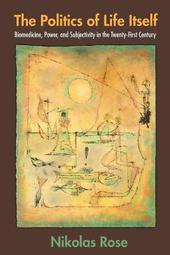
|
The Politics of Life Itself: Biomedicine, Power, and Subjectivity in the Twenty-First Century
Paperback / softback
Main Details
| Title |
The Politics of Life Itself: Biomedicine, Power, and Subjectivity in the Twenty-First Century
|
| Authors and Contributors |
By (author) Nikolas Rose
|
| Series | In-Formation |
|---|
| Physical Properties |
| Format:Paperback / softback | | Pages:368 | | Dimensions(mm): Height 235,Width 152 |
|
| Category/Genre | History of Western philosophy |
|---|
| ISBN/Barcode |
9780691121918
|
| Classifications | Dewey:194 |
|---|
| Audience | | Professional & Vocational | | Tertiary Education (US: College) | |
|---|
|
Publishing Details |
| Publisher |
Princeton University Press
|
| Imprint |
Princeton University Press
|
| Publication Date |
19 November 2006 |
| Publication Country |
United States
|
Description
Examines the developments in life sciences and biomedicine that have led to the politicization of medicine, human life, and biotechnology. This book analyzes molecular biopolitics, examining developments in genomics, neuroscience, pharmacology, and psychopharmacology and the ways they have affected racial politics, crime control, and psychiatry.
Author Biography
Nikolas Rose is James Martin White Professor of Sociology and Director of the BIOS Centre for the Study of Bioscience, Biomedicine, Biotechnology and Society at the London School of Economics and Political Science. His books include "The Psychological Complex, Governing the Soul, Inventing Our Selves", and "Powers of Freedom: Reframing Political Thought".
Reviews"This book offers a much-needed examination of recent developments that have led to the widespread politicization of medicine, human life, and biotechnology... Nikolas Rose concludes that these developments have profound consequences for who we think we are, and who we want to be."--LSE News and Views "From tattoos to organ transplants, cosmetic surgery to circumcision, obsessive dieting to exercise, the practice of manipulating bodies is increasingly widespread. But have we passed into a new phase of manipulation evidenced by the prevalent use of medicine to adjust our moods, enhance sports performance, slow ageing or alter fetuses? Nikolas Rose ... argues that a threshold has been crossed into a world of 'biological citizenship' in which humans view themselves at the molecular level, medicine is based on customization, and biology poses fewer and fewer limits on life. For Rose, however, this is not always a bad thing."--Jessica Lovaas, Journal of Biosocial Science "There is much to admire in his account of the forms that such a politics is taking, and I would encourage the reader to engage with this work."--Simon Reid-Henry, Cultural Geographies "Rose's great strength lies in drawing together disparate strands from a variety of sources--from the empirical work of colleagues to policy documents--and neatly labelling and organizing emergent tendencies to invite further reflection, often with a nod (or more) to recent French social theory."--Steve Fuller, Sociology
|